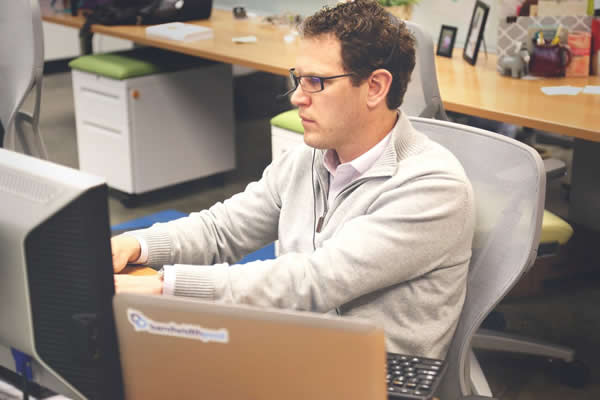Positive Health Online
Your Country

How to Cope with the Stress of City Living
by Christopher Paul Jones(more info)
listed in nlp, originally published in issue 241 - October 2017
If you live in or are working in a big city, life can be stressful.
You navigate rush hour to play that cosy game of sardines on the train every morning. You dodge the tourist that’s standing on the wrong side on the escalator, and if you stop to check where you are going for a split second, it tends to make the other commuters who are just as rushed as you a little bit cross! If you're not power walking at 100 miles an hour and reading the minds of the people around you so you don’t get in their way, then there must be something wrong with you.

Then there’s the noise, the, traffic, the fumes, and let’s not even start on the cost of living, because if you want to buy something simple like a cup of coffee, you’d better have your credit card with you.
So how can you get away from the stress of city living without leaving the city behind?
Christopher Paul Jones, Harley Street therapist and Fear Phobia stress and anxiety expert has some quick tips for dealing with the stresses and strains of living in the city:
Tip 1 - Find the Reasons for Your Stress
Ask yourself:
- What is the focus of my stress; what am I thinking about?
- What do I believe to feel this way? (i.e. are you running late and thinking about the consequences of that, like missing an appointment or flight?);
- What specifically am I predicting will happen and how likely is that?
- What evidence do I have to base this on?
- How important would the issue that is making me stressed be in a day, a week a month or a years’ time?
Tip 2: Change Your Breathing
One of the quickest ways to change your stress levels is to focus on your breathing. When you are stressed or anxious, you’re breathing usually becomes fast and shallow. The key to changing this is to breathe from your diaphragm, so try this technique and see what happens:
- Place one hand on your chest (this hand should remain still) and the other hand on your stomach (this one should move when you breathe);
- Now breathe in slowly through your nose for four seconds, breathing down into your stomach (if your hand moves, you are doing it right), hold this breath for 8 seconds, then breathe out for 12 seconds as your stomach moves in.
Keep repeating this method for a few minutes and you will find that you become relaxed, and much more centred. Now here’s where it gets a bit New Age. According to research, the heart and the brain have neurological connections. By breathing into the heart, you create a connection between the brain and the heart that is called coherence. Here’s how to do it:
- Start by placing your hand on your heart, then take deep breaths imagining the oxygen filling up your heart as you breathe in for the count of 5, and then out for the count of 5, slowly and evenly;
- Repeat this for a few minutes focusing on three things you are grateful for, three things that make you happy and three things that makes you feel relaxed.
See how quickly you notice a change in how you feel.

Tip 3: Change Your Physiology
Did you know your emotions affect your body and your body affects your emotions? All you need to do to change a stressful situation, is change your physiology. Stand tall, pull your shoulders back, hold your head up and put a big smile on your face. It’s guaranteed you'll get a space on the tube, because people will think you're a little bit crazy, but aside from that, if you maintain this stance whilst trying to think of something that is making you anxious, you’ll find it’s nearly impossible to feel bad.
Tip 4: Change Your Vision
Navigating through busy cities, whether on foot, public transport or in a car, can require a lot of our attention. We tend to go into goal focused mode when we’re trying to get where we need to be, avoiding traffic jams, delayed trains, and dawdling tourists. Our mind tends to fill with inner chatter that can be pretty negative and this can increase stress levels. This single-minded focus is known as foveal vision and when we are under pressure it can actually be quite stressful.
If we use our peripheral vision, it is less stressful and can help us relax. Peripheral vision turns down our inner talk and shifts our focus, allowing us to breath and quieten our mind.
Here’s how you move from foveal vision to peripheral vision:
- Look straight ahead and focus your attention on a fixed position in front of you, just above eye level;
- Hold your arms straight out in front of you, with your thumbs pointing upwards, and still focusing straight ahead, relax the muscles around your eyes, soften your gaze and become aware of your breathing;
- Keeping your attention on your fixed position and without moving your head, slowly move your arms out to the side. As you do this, start taking in more of the room around you;
- Stop moving your arms when you can no longer see your thumbs from the corner of your eyes and let your arms slowly drop to your sides;
- Keeping your eyes relaxed and still looking ahead, imagine your vision expanding even further and notice even more around you. Begin to see more on your left, then on your right and notice how you are even beginning to see so far back on either side, that you can almost see behind your head;
- Continue taking deep breaths, looking straight ahead and keep broadening your awareness. Keep going until you notice that the internal noise in your head starts to dissipate and then eventually disappears.
Tip 5: Change Your Focus
Another good way to remove stress is to change what you are focusing on.
- This time while breathing deeply, start to notice everything at the edge of your vision;
- Become aware of 4 things you can SEE around you without moving your head, remembering to keep your eye muscles softened;
- Now become aware of 4 things you can HEAR around you, external sounds or any sounds inside your head. Continue breathing deeply;
- Now become aware of 4 things you can FEEL around you, like your feet on the floor, the tension of muscles in your body, the sensations on your skin, the awareness of your heart, lungs and other organs. Continue breathing deeply.
Repeat the steps above, this time focussing on three things you See, Hear and Feel around you, then repeat for two things you See, Hear and Feel around you and then one thing you See, Hear and Feel around you. Notice how you feel differently.

Tip 6: Move Your Feelings
When you feel your stress levels starting to build, notice where in your body you feel those feelings and how intense they are. When you are aware of them, you can change them. Here’s how:
- Focus on how the feeling is moving about in your body;
- Take the feeling out of your body and spin it in front of you like a wheel;
- Imagine what colour it is, then change the colour to something more pleasing;
- Reverse the direction it is spinning in;
- Pull the feeling back into the body while it is still spinning in the opposite direction;
- Spin it faster and faster, making it smaller and smaller until it disappears;
Repeat this as necessary and see what happens.
So, the next time the stress of the city is getting you down remember, changing how you feel is easier than you think.
Comments:
-
No Article Comments available